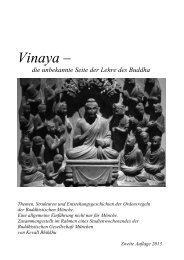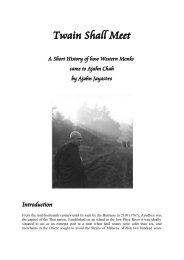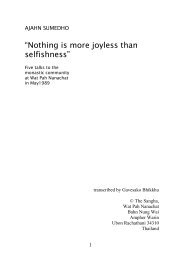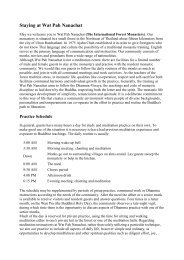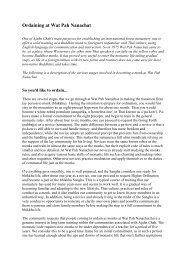WPN New Chants - Wat Pah Nanachat
WPN New Chants - Wat Pah Nanachat
WPN New Chants - Wat Pah Nanachat
You also want an ePaper? Increase the reach of your titles
YUMPU automatically turns print PDFs into web optimized ePapers that Google loves.
<strong>New</strong> <strong>Chants</strong> for<br />
<strong>Wat</strong> <strong>Pah</strong> <strong>Nanachat</strong>
<strong>New</strong> <strong>Chants</strong> for<br />
<strong>Wat</strong> <strong>Pah</strong> <strong>Nanachat</strong><br />
(Trial-Version Rains-Retreat 2009)<br />
© <strong>Wat</strong> <strong>Pah</strong> <strong>Nanachat</strong><br />
Bahn Bung Wai<br />
Ampher Warin Chamrab<br />
Ubon Rachathani 34310<br />
THAILAND<br />
Published ublished for for for free free distribution.<br />
distribution.<br />
The material in this boolket may not be reproduced for sale.<br />
Permission for printing for free distribution may be obtained<br />
by the Abbot of <strong>Wat</strong> <strong>Pah</strong> Nanacht (at the above address)<br />
2
Contents:<br />
Patti-dæna-gæthæ .................................................................................4<br />
Dhætu-pa¥ikþla-paccavekkha¼a-pæ¥ho ..............................................6<br />
Sabbe sa³khæræ aniccæ..................................................................... 10<br />
Khemækhema-sara¼a-gamana-paridøpikæ-gæthæ.............................. 12<br />
Ariya-dhana-gæthæ............................................................................ 14<br />
Ti-lakkha¼’ædi-gæthæ........................................................................ 15<br />
Bhæra-sutta-gæthæ ............................................................................. 17<br />
Bhadd’eka-ratta-gæthæ...................................................................... 18<br />
Dhamma-gærav’ædi-gæthæ................................................................. 20<br />
Ovæda-pæ¥imokkha-gæthæ ................................................................ 22<br />
Pa¥hama-buddha-bhæsita-gæthæ ....................................................... 24<br />
Pacchima-ovæda-gæthæ..................................................................... 25<br />
Ænæpænassati-sutta-pæ¥ho................................................................. 26<br />
Ariy’a¥¥h’a³gika-magga-pæ¥ho ......................................................... 32<br />
Dhamma-cakkappavattana-sutta-pæ¥ho........................................... 40<br />
Dhamma-pahaµsæna-pæ¥ho ............................................................ 51<br />
The Highest Blessings (Ma³gala Sutta) ........................................... 55<br />
Tæyana-gæthæ.................................................................................... 57<br />
Apalokanakamma for Sanghadana.................................................. 59<br />
3
Patti-dæna-gæthæ<br />
Verses on the Sharing of Merits<br />
[Handa mayaµ patti-dæna-gæthæyo bha¼æma se]<br />
Puññass’idæni katassa yæn’aññæni katæni me<br />
Tesañ-ca bhægino hontu sattænantæppamæ¼aka<br />
4<br />
May all the m÷er÷its ÷I h÷ave made<br />
And whatever action ×I ÷have done<br />
Be sh÷ared w÷ith ÷ev÷ery b÷eing<br />
Without m÷eas÷ure w÷ith÷out end<br />
Ye piyæ gu¼avantæ ca mayhaµ mætæ-pitæ-dayo<br />
Di¥¥hæ me cæpy-adi¥¥hæ væ aññe majjhatta-verino<br />
Those loved a×nd full of g÷oodness<br />
My mother and my f×ath÷er dear<br />
Beings seen by me and th÷ose ÷unseen<br />
Those neutr×al and ÷averse<br />
Sattæ ti¥¥hanti lokasmiµ te bhummæ catu-yonikæ<br />
Pañc’eka-catu-vokæræ saµsarantæ bhavæbhave<br />
Beings__ est÷ab÷lished ÷in t÷he world<br />
From the four-fold gr×ounds ÷of birth<br />
Whatever f÷ac÷ult÷ies th÷ey have<br />
Aris×ing in the ÷end÷less round
Ñætaµ ye patti-dænam-me anumodantu te sayaµ<br />
Ye c’imaµ nappajænanti devæ tesaµ nivedayuµ<br />
Whatever beings kn÷ow t÷his ÷de÷dic÷ation<br />
May they rej×oice ÷in it<br />
And as for those still ÷unaware<br />
Then may the devas m×ake ÷it known<br />
Mayæ dinnæna-puññænaµ anumodana-hetunæ<br />
Sabbe sattæ sadæ hontu averæ sukha-jøvino<br />
Khemappadañ-ca pappontu tesæsæ sijjhataµ subhæ<br />
My offerings of m÷er÷its here<br />
Are caus×es to ÷rejoice<br />
May all__ ÷be÷ings l÷ive ÷at ease<br />
And always f×ree f÷rom strife<br />
May they att×ain sec÷urity<br />
In b÷eau÷ty m÷ay t÷hey a÷ll s÷ucceed.<br />
5
Dhætu-pa¥ikþla-paccavekkha¼a-pæ¥ho<br />
Reflection on the Repulsiveness of the Four Requisites<br />
[Handa mayaµ dhætu-pa¥ikþla-paccavekkha¼a-pæ¥haµ<br />
bha¼æma se]<br />
Yathæ paccayaµ pavattamænaµ dhætu-mattam-ev’etaµ<br />
6<br />
Composed out of elements of n×ature acc÷ordi÷ng t÷o c÷aus÷es a÷nd<br />
c÷ond÷itions<br />
Yad idaµ cøvaraµ. Tad upabhuñjako ca puggalo<br />
Are these r÷obes a÷nd s÷o i÷s t÷he p÷ers÷on w÷earing them<br />
Dhætu-mattako<br />
Composed of only ÷elements,<br />
Nissatto<br />
Not a b÷eing<br />
Nijjøvo<br />
Not ÷a soul<br />
Suñño<br />
÷Empt÷y ÷of h÷av÷ing ÷a self.<br />
Sabbæni pana imæni cøvaræni ajigucchanøyæni<br />
At first all these r÷obes a÷re n÷ot y÷et d÷isg÷usting<br />
Imaµ pþti-kæyaµ patvæ<br />
But touching this p×utrid b÷ody<br />
Ativiya jigucchanøyæni jæyanti.<br />
They be÷come disg÷ust÷ing a÷s well.
Yathæ paccayaµ pavattamænaµ dhætu-mattam-ev’etaµ<br />
Composed out of elements of n×ature acc÷ordi÷ng t÷o c÷aus÷es a÷nd<br />
c÷ond÷itions<br />
Yad idaµ pi¼ðapæto. Tad upabhuñjako ca puggalo<br />
Is this ÷almsf÷ood a÷nd ÷so ÷is t÷he p÷ers÷on e÷ating it<br />
Dhætu-mattako<br />
Composed of only ÷elements,<br />
Nissatto<br />
Not a b÷eing<br />
Nijjøvo<br />
Not ÷a soul<br />
Suñño<br />
÷Empt÷y ÷of h÷av÷ing ÷a self.<br />
Sabbo panæyaµ pi¼ða-pæto ajigucchanøyo<br />
At first all this ÷almsf÷ood ÷is n÷ot y÷et d÷isgusting<br />
Imaµ pþti-kæyaµ patvæ<br />
But touching this p×utrid b÷ody<br />
Ativiya jigucchanøyo jæyati.<br />
It bec÷omes d÷isg÷ust÷ing ÷as well<br />
Yathæ paccayaµ pavattamænaµ dhætu-mattam-ev’etaµ<br />
Composed out of elements of n×ature acc÷ordi÷ng t÷o c÷aus÷es a÷nd<br />
c÷ond÷itions<br />
Yad idaµ senæsanaµ. Tad upabhuñjako ca puggalo<br />
Is this dw÷ell÷ing a÷nd ÷so ÷is t÷he p÷ers÷on ÷using it<br />
7
Dhætu-mattako<br />
8<br />
Composed of only ÷elements,<br />
Nissatto<br />
Not a b÷eing<br />
Nijjøvo<br />
Not ÷a soul<br />
Suñño<br />
÷Empt÷y ÷of h÷av÷ing ÷a self.<br />
Sabbæni pana imæni senæsanæni ajigucchanøyæni<br />
At first all these dw÷ell÷ings a÷re n÷ot y÷et d÷isg÷usting<br />
Imaµ pþti-kæyaµ patvæ<br />
But touching this p×utrid b÷ody<br />
Ativiya jigucchanøyæni jæyanti<br />
They bec÷ome d÷isg÷ust÷ing ÷as well<br />
Yathæ paccayaµ pavattamænaµ dhætu-mattam-ev’etaµ<br />
Composed out of elements of n×ature acc÷ordi÷ng t÷o c÷aus÷es a÷nd<br />
c÷ond÷itions<br />
Yad idaµ gilæna-paccaya-bhesajja-parikkhæro<br />
Tad upabhuñjako ca puggalo<br />
Is this m÷ed÷ic÷in÷al req÷ui÷site a÷nd ÷so ÷is t÷he p÷ers÷on th÷at t÷akes it<br />
Dhætu-mattako<br />
Composed of only ÷elements<br />
Nissatto<br />
Not a b÷eing
Nijjøvo<br />
Not ÷a soul<br />
Suñño<br />
÷Empt÷y ÷of h÷av÷ing ÷a self<br />
Sabbo panæyaµ gilæna-paccaya bhesajja-parikkhæro<br />
ajigucchanøyo<br />
At first this m÷ed÷ic÷in÷al r÷equ÷is÷ite ÷is n÷ot y÷et d÷isg÷usting<br />
Imaµ pþti-kæyaµ patvæ<br />
But touching this p×utrid b÷ody<br />
Ativiya jigucchanøyo jæyati.<br />
It bec÷omes d÷isg÷ust÷ing ÷as well<br />
=<br />
=<br />
9
Sabbe sa³khæræ aniccæ<br />
[Sabbe sa³khæræ aniccæ]<br />
10<br />
All conditioned things_ are imp÷ermanent<br />
Sabbe sa³khæræ dukkhæ<br />
All conditioned things_ are d÷ukkha<br />
Sabbe dhammæ anattæ<br />
Everything_ is v÷oid ÷of self<br />
Addhuvaµ jøvitaµ<br />
This life_ it c÷ann÷ot last<br />
Dhuvaµ mara¼aµ<br />
De÷ath th÷ough w÷ill last<br />
Avassaµ mayæ maritabbaµ<br />
It is ×inevitable th÷at w÷e die<br />
Mara¼a-pariyosænam me jøvitaµ<br />
Death is the c÷ulm÷in÷at÷ion ÷of o÷ur life<br />
Jøvitaµ me aniyataµ<br />
Our lives_ are unc÷ertain<br />
Mara¼aµ me niyataµ<br />
Vata<br />
De÷ath i÷s c÷ertain<br />
This ind÷eed_ ÷is true<br />
Ayaµ kæyo<br />
This b÷ody
Aciraµ<br />
In no l×ong time<br />
Apeta-viññæ¼o<br />
Once void of c×onsc÷iousness,<br />
Chuððho<br />
And c÷ast ÷away<br />
Adhisessati<br />
W÷ill rest<br />
Pa¥haviµ<br />
Up÷on t÷he ground<br />
Kali³garaµ iva<br />
Just like a r×otte÷n log<br />
Niratthaµ<br />
Completely v÷oid ÷of use<br />
Aniccæ vata sa³khæræ<br />
Truly_ c×onditioned thi÷ngs c÷an n÷ot last<br />
Uppæda-vaya-dhammino<br />
Their nature is to r÷ise a÷nd fall<br />
Uppajjitvæ nirujjhanti<br />
Having ×arisen th÷ings m÷ust cease<br />
Tesaµ vþpasamo sukho<br />
It’s bl÷issf÷ul_ wh÷en th÷ey c÷ome ÷to peace.<br />
11
Khemækhema-sara¼a-gamana-paridøpikægæthæ<br />
Verses on Going to True and False Refuges<br />
[Handa mayaµ khemækhema-sara¼a-gamana-paridøpikægæthæyo<br />
bha¼æma se]<br />
Bahuµ ve sara¼aµ yanti Pabbatæni vanæni ca<br />
Ãræma-rukkha-cetyæni Manussæ bhaya-tajjitæ<br />
12<br />
To many refug÷es t÷hey run<br />
To mount×ain slopes and f×or÷est glades<br />
To parks and m÷onum÷ents a÷nd trees<br />
People that are f×illed w÷ith fear<br />
N’etaµ kho sara¼aµ khemaµ N’etaµ sara¼am-uttamaµ<br />
N’etaµ sara¼am-ægamma Sabba-dukkhæ pamuccati<br />
Such a refuge is n÷ot s÷ecure<br />
Such a refuge is n×ot s÷upreme<br />
Such ×a refuge d÷oes n÷ot bring<br />
Complete ×release from s÷uff÷ering<br />
Yo ca Buddhañ-ca Dhammañ-ca Sa³ghañ-ca sara¼aµ gato=<br />
Cattæri ariya-saccæni Sammappaññæya passati
Who÷ev÷er g÷oes ÷to ÷refuge<br />
In the T×ripl÷e Gem<br />
Sees_ with r×ight disc÷ernment<br />
The F÷our N÷ob÷le Truths<br />
Dukkhaµ dukkha-samuppædaµ Dukkhassa ca atikkamaµ<br />
Ariyañ-c’a¥¥h’a³gikaµ maggaµ Dukkhþpasama-gæminaµ<br />
Dukkha_ it’s ar÷ising<br />
And that which l×ies b÷eyond<br />
The No÷ble ÷Eightf÷old Path<br />
That leads t×he way to s×uffer÷ing’s end<br />
Etaµ kho sara¼aµ khemaµ Etaµ sara¼am-uttamaµ<br />
Etaµ sara¼am-ægamma Sabba-dukkhæ pamuccatø-ti<br />
Such ×a refuge ÷is s÷ecure<br />
Such a refuge ×is s÷upreme<br />
Such a r÷ef÷uge t÷rul÷y brings<br />
Complete ×release from s÷uff÷ering.=<br />
13
Ariya-dhana-gæthæ<br />
Verses on the Riches of a Noble One<br />
[Handa mayaµ ariya-dhana-gæthæyo bha¼æma se]<br />
Yassa saddhæ Tathægate Acalæ supati¥¥hitæ<br />
Sølañ-ca yassa kalyæ¼aµ Ariya-kantaµ pasaµsitaµ<br />
14<br />
One whose faith in the Tath־gata<br />
Is unshaken and est×abl÷ished well<br />
Whose virtue is a pl÷eas÷ant thing<br />
The Noble Ones enj×oy a÷nd praise.<br />
Sa³ghe pasædo yass’atthi Uju-bhþtañ-ca dassanaµ<br />
Adaliddo-ti taµ æhu Amoghaµ tassa jøvitaµ<br />
Whose trust_ is in the S÷angha<br />
Who sees things rightly ×as th÷ey are<br />
It is s÷aid t÷hat n÷ot ÷in vain<br />
And und×eluded ×is t÷heir life<br />
Tasmæ saddhañ-ca sølañ-ca Pasædaµ dhamma-dassanaµ<br />
Anuyuñjetha medhævø Saraµ buddhæna sæsanan-ti<br />
To virt×ue and t÷o faith<br />
To trust_ to s×eei÷ng truth<br />
To these_ the wise dev÷ote th÷emselves<br />
The Buddh×a’s teaching i×n t÷heir mind.
Ti-lakkha¼’ædi-gæthæ<br />
Verses on the Three Characteristics<br />
[Handa mayaµ ti-lakkha¼’ædi-gæthæyo bha¼æma se]<br />
Sabbe sa³khæræ aniccæ-ti Yadæ paññæya passati<br />
Atha nibbindati dukkhe Esa maggo visuddhiyæ<br />
“Impermanent are all cond÷itioned things”<br />
When_ with wisdom t×his ÷is seen<br />
One turns_ aw÷ay fr÷om ÷all d÷ukkha<br />
This is the path to p×u÷rity<br />
Sabbe sa³khæræ dukkhæ-ti Yadæ paññæya passati<br />
Atha nibbindati dukkhe Esa maggo visuddhiyæ<br />
“Dukkha are all cond÷itioned things”<br />
When_ with wisdom t×his ÷is seen<br />
One turns_ aw÷ay fr÷om ÷all d÷ukkha<br />
This is the path to p×u÷rity<br />
Sabbe dhammæ anattæ-ti Yadæ paññæya passati<br />
Atha nibbindati dukkhe Esa maggo visuddhiyæ<br />
“There is no self in ÷anything”<br />
When_ with wisdom t×his ÷is seen<br />
One turns_ aw÷ay fr÷om ÷all d÷ukkha<br />
This is the path to p×u÷rity<br />
15
Appakæ te manussesu Ye janæ pæra-gæmino<br />
Athæyaµ itaræ pajæ Tøram-evænudhævati<br />
16<br />
Few amongst hum÷ankind<br />
Are those who ×go ÷beyond<br />
Yet there are the m÷any folks<br />
Who walk a×nd walk_ abo÷ut t÷his shore<br />
Ye ca kho sammad-akkhæte Dhamme dhammænuvattino<br />
Te janæ pæram-essanti Maccu-dheyyaµ sud’uttaraµ<br />
Wherever there is w÷ell-t÷aught Dh÷amma<br />
Those who train in l×ine w÷ith it<br />
Are the ones who w÷ill c÷ross ÷over<br />
The realm ×of death_ so h÷ard ÷to flee<br />
Ka¼haµ dhammaµ vippahæya Sukkaµ bhævetha pa¼ðito<br />
Okæ anokam-ægamma Viveke yattha dþramaµ<br />
Tatræbhiratim-iccheyya Hitvæ kæme akiñcano<br />
Abandoning the d÷ark÷er states<br />
The wise purs×ue t÷he bright<br />
From the flo÷ods_ d÷ry l÷and th÷ey reach<br />
Living w×ithdrawn_ so h÷ard ÷to do<br />
Such rare d×elight_ o÷ne sh÷ould ÷de÷sire<br />
Sense pleas×ures cast aw÷ay_ n÷ot b÷ei÷ng ÷anything
Bhæra-sutta-gæthæ<br />
Verses on the Burden<br />
[Handa mayaµ bhæra-sutta-gæthæyo bha¼æma se]<br />
Bhæræ have pañcakkh×andhæ Bhæra-hæro ca p×ugg÷alo<br />
Bhær’ædænaµ dukkhaµ loke Bhæra-nikkh×epanaµ s÷ukhaµ<br />
The five__ aggregates indeed are b÷urdens<br />
The beast of burden th×ough ÷is man<br />
In this world__ to t÷ake ÷up s÷uch ÷a w÷eight ÷is d÷ukkha<br />
To set ×it down__ is h×app÷iness<br />
Nikkhipitvæ garuµ bhæraµ Aññaµ bhæraµ anædiya<br />
Samþlaµ ta¼haµ abbuyha Nicchæto parinibbuto-ti<br />
A heavy burden c÷ast ÷away<br />
Not taking on an×oth÷er load<br />
One pulls out cr÷aving fr÷om t÷he root<br />
Desir×es stilled__ o÷ne ÷is ext÷inguished.<br />
17
Bhadd’eka-ratta-gæthæ<br />
Verses on a Shining Night of Prosperity<br />
[Handa mayaµ bhadd’eka-ratta-gæthæyo bha¼æma se]<br />
Atøtaµ nænvægameyya Nappa¥ika³khe anægataµ<br />
Yad atøtam-pahønan-taµ Appattañ-ca anægataµ<br />
18<br />
One should not__ rev÷ive t÷he past<br />
Nor speculate on wh×at’s ÷to come<br />
What is past__ has b÷een ÷ab÷andoned<br />
The fut×ure is__ un-r×e÷alised<br />
Paccuppannañ-ca yo dhammaµ Tattha tattha vipassati<br />
Asaµhiraµ asa³kuppaµ Taµ viddhæm-anubrþhaye<br />
Whatever presently ar÷is÷en state<br />
There__ just there one cl×earl÷y sees<br />
Not drawn ×away__ not sh÷ake÷n up<br />
That insight ×is o÷ne’s strength<br />
Ajj’eva kiccam-ætappaµ Ko jaññæ mara¼aµ suve<br />
Na hi no sa³garan-tena Mahæ-senena maccunæ<br />
Ardently doing one’s t÷ask ÷today<br />
Tomorrow who knows d×eath m÷ay come<br />
Facing the m×ighty h÷ordes ÷of death<br />
Indeed__ ×we cannot st÷rike ÷a deal
Evaµ vihærim-ætæpiµ Aho-rattam-atanditaµ<br />
Taµ ve bhadd’eka-ratto-ti Santo æcikkhate munø-ti<br />
To dwell with ÷en÷erg÷y ÷aroused<br />
Thus for a night of n×on-d÷ecline<br />
“That is a ÷night__ ÷of sh÷in÷ing p÷rosperity”<br />
So it was taught by the p×eacef÷ul sage.<br />
19
Dhamma-gærav’ædi-gæthæ<br />
Verses on Respect for the Dhamma<br />
[Handa mayaµ dhamma-gærav’ædi-gæthæyo bha¼æma se]<br />
Ye ca atøtæ Sambuddhæ Ye ca Buddhæ anægatæ<br />
Yo c’etarahi Sambuddho Bahunnaµ soka-næsano<br />
20<br />
All the Buddhas ÷of t÷he past<br />
All the Buddhas y×et t÷o come<br />
And he__ who is n÷ow t÷he B÷uddha<br />
Dispell×ers of m÷uch s÷orrow<br />
Sabbe saddhamma-garuno Vihariµsu viharanti ca<br />
Atho pi viharissanti Esæ Buddhæna dhammatæ<br />
Those having lived or l÷iv÷ing now<br />
Those liv×ing in the f÷uture<br />
All__ do rev÷ere__ t÷he Tr÷ue Dh÷amma<br />
That is t×he nature ÷of ÷a B÷uddha<br />
Tasmæ hi atta-kæmena Mahattam-abhika³khatæ<br />
Saddhammo garu-kætabbo Saraµ Buddhæna sæsanaµ<br />
Therefore des÷ir÷ing o÷ne’s o÷wn good<br />
Pursu×ing greatest ÷asp÷ir÷ations<br />
One should r×evere__ t÷he T÷rue Dh÷amma<br />
Remembering the m÷ess÷age ÷of t÷he B÷uddhas
Na hi dhammo adhammo ca Ubho sama-vipækino<br />
Adhammo nirayaµ neti Dhammo pæpeti suggatiµ<br />
What is true Dh÷am÷ma a÷nd w÷hat not<br />
Will never have the s×ame r÷esults<br />
While lack of Dh÷amm÷a l÷eads ÷to hell<br />
True Dhamm×a takes one ÷on ÷a g÷ood course<br />
Dhammo have rakkhati dhamma-cæriµ<br />
Dhammo suci¼¼o sukham-ævahæti<br />
Esæ’nisaµso dhamme suci¼¼e<br />
The Dhamm×a guards__ who lives in l×ine w÷ith it<br />
And leads to h÷app÷in÷ess wh÷en pr÷act÷ised well<br />
This__ is t×he benefit of D÷hamm÷a pr÷actice.<br />
21
Ovæda-pæ¥imokkha-gæthæ<br />
Verses on the Patimokkha Exhortation<br />
[Handa mayaµ ovæda-pæ¥imokkha gæthæyo bha¼æma se]<br />
Sabba-pæpassa akara¼aµ<br />
22<br />
Not d÷oi÷ng ÷an÷y ÷evil<br />
Kusalassþpasampadæ<br />
The undertaking ×of t÷he good<br />
Sacitta-pariyodapanaµ<br />
To p÷ur÷if÷y o÷ne’s mind<br />
Etaµ Buddhæna sæsanaµ<br />
These are t×he teachings ÷of a÷ll B÷uddhas<br />
Khantø paramaµ tapo tøtikkhæ<br />
Patient ×endurance is the highest pr÷act÷ice b÷urn÷ing o÷ut<br />
d÷ef÷ilements<br />
Nibbænaµ paramaµ vadanti Buddhæ<br />
The Buddh×as say__ Nibbæna ×is s÷upreme<br />
Na hi pabbajito parþpaghætø<br />
Not Gone F÷orth__ a÷re th÷ose w÷ho ÷inj÷ure ÷others<br />
Sama¼o hoti paraµ vihe¥hayanto.<br />
Who troub×les others c÷an’t ÷be c×alled ÷a monk<br />
Anþpavædo anþpaghæto<br />
Not to ÷insult__ and n÷ot ÷to ÷injure
Pæ¥imokkhe ca saµvaro<br />
To be r×estrained in the mon×as÷tic code<br />
Mattaññutæ ca bhattasmiµ<br />
Knowing one’s m÷easure ÷at ÷the meal<br />
Pantañ-ca sayan’æsanaµ<br />
Retreating to a l×on÷ely place<br />
Adhicitte ca æyogo<br />
Devot×ion to the h÷igh÷er mind<br />
Etaµ Buddhæna sæsanan-ti<br />
These__ are the te÷ach÷ings ÷of a÷ll B÷uddhas.<br />
23
Pa¥hama-buddha-bhæsita-gæthæ<br />
Verses of the Buddha’s First Exclamation<br />
[Handa mayaµ pa¥hama-buddha-bhæsita-gæthæyo bha¼æma se]<br />
Aneka-jæti-saµsæraµ Sandhævissaµ anibbisaµ<br />
Gaha-kæraµ gavesanto Dukkhæ jæti punappunaµ<br />
24<br />
For many lifetimes in the r÷ound ÷of birth<br />
Wandering on__ ×endl÷essly<br />
For the b÷uild÷er ÷of t÷his h÷ouse ÷I searched<br />
How painful is__ rep×eate÷d birth<br />
Gaha-kæraka di¥¥ho’si Puna gehaµ na kæhasi<br />
Sabbæ te phæsukæ bhaggæ Gaha-kþ¥aµ visa³khataµ<br />
Visa³khæra-gataµ cittaµ Ta¼hænaµ khayam-ajjhagæ<br />
House-builder__ y÷ou’ve b÷een seen<br />
Another home you ×will n÷ot build<br />
All your r÷aft÷ers h÷ave b÷een snapped<br />
Dismantl×ed is your r÷idge-pole<br />
The non-c×onstructing m÷ind__<br />
H÷as c÷ome t÷o cr÷av÷ing’s end.<br />
=
Pacchima-ovæda-gæthæ<br />
Verses on the Last Instructions<br />
[Handa mayaµ pacchima-ovæda gæthæyo bha¼æma se]<br />
Handa dæni bhikkhave æmantayæmi vo<br />
Now I c÷all up÷on y÷ou bh÷ikkhus<br />
Vaya-dhammæ sa³khæræ<br />
Change__ is t×he nature ÷of s÷ankh÷aras<br />
appamædena sampædetha<br />
Perfect y×ourselves n÷ot being n×eg÷ligent<br />
ayaµ tathægatassa pacchimæ væcæ<br />
These are t×he Buddha’s f÷in÷al words.<br />
= =<br />
25
Ænæpænassati-sutta-pæ¥ho<br />
The Teaching on Mindfulness of Breathing<br />
[Handa mayam ænæpænassati-sutta-pæ¥haµ bha¼æma se:]<br />
Ænæpænassati bhikkhave bhævitæ bahulø-katæ<br />
26<br />
Bhikkhus__ w÷hen mindfulness of br×eathing is d÷eveloped and<br />
c÷ultiv×ated<br />
Mahapphalæ hoti mahæ-nisaµsæ<br />
It is of gr÷eat fruit and great b÷enefit<br />
Ænæpænassati bhikkhave bhævitæ bahulø-katæ<br />
W÷hen mindfulness of br×eathing is d÷eveloped and c÷ultiv×ated<br />
Cattæro satipa¥¥hæne paripþreti<br />
It f÷ulfills the four foundations of m÷indfulness.<br />
Cattæro satipa¥¥hænæ bhævitæ bahulø-katæ<br />
When t÷he four foundations of m×indfulness are d÷eveloped and<br />
c÷ultiv×ated<br />
Satta-bojjha³ge paripþrenti<br />
They f÷ulfill the seven factors of aw÷akening<br />
Satta-bojjha³gæ bhævitæ bahulø-katæ<br />
When t÷he seven factors of aw×akening are d÷eveloped and<br />
c÷ultiv×ated<br />
Vijjæ-vimuttiµ paripþrenti<br />
They f÷ulfill true knowledge and del÷iverance<br />
Kathaµ bhævitæ ca bhikkhave ænæpænassati<br />
kathaµ bahulø-katæ
A÷nd how__ bhikkhus__<br />
is mindfulness of br×eathing d÷eveloped and c÷ultiv×ated<br />
Mahapphalæ hoti mahæ-nisaµsæ<br />
So that it is of gr÷eat fruit and great b÷enefit<br />
Idha bhikkhave bhikkhu<br />
Here bhikkhus__ a bh÷ikkhu<br />
Arañña-gato væ<br />
Gone t÷o the f×orest<br />
Rukkha-mþla-gato væ<br />
To t÷he foot of ÷a tree<br />
Suññægæra-gato væ<br />
Or to an e×mpt÷y hut<br />
Nisødati palla³kaµ æbhujitvæ<br />
S÷its down__ having cr÷ossed h÷is legs<br />
Ujuµ kæyaµ pa¼idhæya parimukhaµ satiµ upa¥¥hapetvæ<br />
Sets h÷is body ÷erect__<br />
having established m×indfulness in fr÷ont ÷of him<br />
So sato’va assasati__ sato’va passasati<br />
Ever mindful he breat÷hes in__ mindful he b÷reat÷hes out<br />
Døghaµ væ assasanto_ døghaµ assasæmø-ti pajænæti<br />
Breathing i×n long__ he knows__ ‘I br÷eathe ÷in long’<br />
Døghaµ væ passasanto_ døghaµ passasæmø-ti pajænæti<br />
Breathing o÷ut long__ he knows__ ‘I br÷eathe o÷ut long’<br />
Rassaµ væ assasanto rassaµ assasæmø-ti pajænæti<br />
27
28<br />
Breathing i×n short__ he knows__ ‘I br÷eathe ÷in short’<br />
Rassaµ væ passasanto rassaµ passasæmø-ti pajænæti<br />
Breathing o÷ut short__ he knows__ ‘I br÷eathe o÷ut short’<br />
Sabba-kæya-patisaµvedø assasissæmø-ti sikkhati<br />
He tr÷ains thus__ ‘I shall breathe ×in__<br />
experiencing the whole b÷ody’<br />
Sabba-kæya-patisaµvedø passasissæmø-ti sikkhati<br />
He tr÷ains thus__ ‘I shall breathe o÷ut__<br />
÷exp÷er÷ienc÷ing t÷he wh÷ole b÷ody’<br />
Passambhayaµ kæya-sa³khæraµ assasissæmø-ti sikkhati<br />
He tr÷ains thus__ ‘I shall breathe ×in__<br />
tranquillising the bodily form÷ations’<br />
Passambhayaµ kæya-sa³khæraµ passasissæmø-ti sikkhati<br />
He tr÷ains thus__ ‘I shall breathe o÷ut__<br />
tr÷anqu÷il÷lis÷ing t÷he b÷odily f÷ormations’<br />
Pøti-patisaµvedø assasissæmø-ti sikkhati<br />
He tr÷ains thus__ ‘I shall breathe ×in__ experiencing r÷apture’<br />
Pøti-patisaµvedø passasissæmø-ti sikkhati<br />
He tr÷ains thus__ ‘I shall breathe o÷ut_ ÷exp÷er÷ienc÷ing r÷apture’<br />
Sukha-patisaµvedø assasissæmø-ti sikkhati<br />
He tr÷ains thus__ ‘I shall breathe ×in__<br />
experiencing pl÷easure’<br />
Sukha-patisaµvedø passasissæmø-ti sikkhati<br />
He tr÷ains thus__ ‘I shall breathe o÷ut__
÷exp÷er÷ienc÷ing pl÷easure’<br />
Citta-sa³khæra-patisaµvedø assasissæmø-ti sikkhati<br />
He tr÷ains thus__ ‘I shall breathe ×in__<br />
experiencing the mental form÷ations’<br />
Citta-sa³khæra-patisaµvedø passasissæmø-ti sikkhati<br />
He tr÷ains thus__ ‘I shall breathe o÷ut__<br />
÷exp÷er÷ienc÷ing t÷he m÷ent÷al f÷orm÷ations’<br />
Passambhayaµ citta-sa³khæraµ assasissæmø-ti sikkhati<br />
He tr÷ains thus__ ‘I shall breathe ×in__<br />
tranquilllising the mental form÷ations’<br />
Passambhayaµ citta-sa³khæraµ passasissæmø-ti sikkhati<br />
He tr÷ains thus__ ‘I shall breathe o÷ut__<br />
tr÷anq÷uil÷lis÷ing t÷he m÷ent÷al f÷orm÷ations’<br />
Citta-patisaµvedø assasissæmø-ti sikkhati<br />
He tr÷ains thus__ ‘I shall breathe ×in__ experiencing t÷he mind’<br />
Citta-patisaµvedø passasissæmø-ti sikkhati<br />
He tr÷ains thus__ ‘I shall breathe o÷ut_ ÷exp÷er÷ienc÷ing t÷he mind’<br />
Abhippamodayaµ cittaµ assasissæmø-ti sikkhati<br />
He tr÷ains thus__ ‘I shall breathe ×in__ gladdening t÷he mind’<br />
Abhippamodayaµ cittaµ passasissæmø-ti sikkhati<br />
He tr÷ains thus__ ‘I shall breathe o÷ut_ g÷ladd÷en÷ing t÷he mind’<br />
Samædahaµ cittaµ assasissæmø-ti sikkhati<br />
He tr÷ains thus__ ‘I shall breathe ×in__<br />
concentrating t÷he mind’<br />
29
Samædahaµ cittaµ passasissæmø-ti sikkhati<br />
30<br />
He tr÷ains thus__ ‘I shall breathe o÷ut__<br />
c÷onc÷ent÷rat÷ing t÷he mind’<br />
Vimocayaµ cittaµ assasissæmø-ti sikkhati<br />
He tr÷ains thus__ ‘I shall breathe ×in__ liberating t÷he mind’<br />
Vimocayaµ cittaµ passasissæmø-ti sikkhati<br />
He tr÷ains thus__ ‘I shall breathe o÷ut__ l÷ib÷er÷at÷ing t÷he mind’<br />
Aniccænupassø assasissæmø-ti sikkhati<br />
He tr÷ains thus__ ‘I shall breathe ×in__<br />
contemplating imp÷ermanence’<br />
Aniccænupassø passasissæmø-ti sikkhati<br />
He tr÷ains thus__ ‘I shall breathe o÷ut__<br />
c÷ont÷empl÷at÷ing ÷imp÷ermanence’<br />
Virægænupassø assasissæmø-ti sikkhati<br />
He tr÷ains thus__ ‘I shall breathe ×in__<br />
contemplating the fading away of p÷assions’<br />
Virægænupassø passasissæmø-ti sikkhati<br />
He tr÷ains thus__ ‘I shall breathe o÷ut__<br />
c÷ont÷emp÷lat÷ing t÷he f÷ad÷ing a÷way ÷of p÷assions’<br />
Nirodhænupassø assasissæmø-ti sikkhati<br />
He tr÷ains thus__ ‘I shall breathe ×in__<br />
contemplating cess÷ation’<br />
Nirodhænupassø passasissæmø-ti sikkhati<br />
He tr÷ains thus__ ‘I shall breathe o÷ut__
c÷ont÷emp÷lat÷ing c÷es÷sation’<br />
Pa¥inissaggænupassø assasissæmø-ti sikkhati<br />
He tr÷ains thus__ ‘I shall breathe ×in__<br />
contemplating rel÷inquishment’<br />
Pa¥inissaggænupassø passasissæmø-ti sikkhati.<br />
He tr÷ains thus__ ‘I shall breathe o÷ut__<br />
c÷ont÷emp÷lat÷ing r÷el÷inquishment’<br />
Evaµ bhævitæ kho bhikkhave ænæpænassati<br />
evaµ bahulø-katæ<br />
Bhikkhus__ that is h÷ow mindfulness of br×eathing is d÷÷eveloped<br />
and c÷ultiv×ated<br />
Mahapphalæ hoti mahæ-nisaµsæ.<br />
Iti.<br />
So that it is of g÷reat fruit and great b÷enefit<br />
Thus__ w÷as ×it said.<br />
= =<br />
31
Ariy’a¥¥h’a³gika-magga-pæ¥ho<br />
The Teaching on the Noble Eightfold Path 1<br />
[Handa mayaµ ariya¥¥ha³gika-magga-pæ¥ham bha¼æma se:]<br />
Ayam-eva ariyo a¥¥h'a³giko maggo__ seyyathødaµ<br />
32<br />
This is the N÷ob÷le ÷Eightf÷old Path<br />
Sammæ-di¥¥hi<br />
R÷ight view<br />
Sammæ-sa³kappo<br />
Right int÷ention<br />
Sammæ-væcæ<br />
R÷ight speech<br />
Sammæ-kammanto<br />
Right ÷action<br />
Sammæ-æjøvo<br />
Right l×ive÷lihood<br />
Sammæ-væyæmo,<br />
Right ÷effort<br />
Sammæ-sati<br />
Right m×indf÷ulness<br />
Sammæ-samædhi<br />
R÷ight__ c÷onc÷ent÷ration<br />
N<br />
=qÜáë=íê~åëä~íáçå=Ñçääçïë=_ÜáââÜì=_çÇÜáÛë=íê~åëä~íáçåK=
Katamæ ca bhikkhave sammæ-di¥¥hi<br />
And what_ Bhikkhus ÷is_ R÷ight View?<br />
Yaµ kho bhikkhave dukkhe ñæ¼aµ<br />
Knowledge of s÷uffering<br />
Dukkha-samudaye ñæ¼aµ<br />
knowledge of the ×origin of s÷uffering<br />
Dukkha-nirodhe ñæ¼aµ<br />
knowledge of the cess÷ati÷on ÷of s÷uff÷ering<br />
Dukkha-nirodha-gæminiyæ pa¥ipadæya ñæ¼aµ<br />
knowledge of t×he path__ leading to the ces÷sat÷ion ÷of s÷uf÷fering.<br />
Ayaµ vuccati bhikkhave sammæ-di¥¥hi.<br />
This_ bhikkhus is c÷alled_ R÷ight View.<br />
Katamo ca bhikkhave sammæ-sa³kappo<br />
And what_ Bhikkhus is R÷ight ÷Int÷ention?<br />
Nekkhamma-sa³kappo<br />
The intention of ren÷un÷ci÷ation<br />
Abyæpæda-sa³kappo<br />
the intention of n÷on-i÷ll-will<br />
Avihiµsæ-sa³kappo<br />
the intention of non-cr×ue÷lty.<br />
Ayaµ vuccati bhikkhave sammæ-sa³kappo.<br />
This_ Bhikkhus is c÷alled_ R÷ight ÷Int÷ention.<br />
Katamæ ca bhikkhave sammæ-væcæ<br />
33
34<br />
And what_ Bhikkhus ÷is_ R÷ight_ Speech?<br />
Musæ-vædæ verama¼ø<br />
Abstaining fr÷om f÷alse speech<br />
Pisu¼æya væcæya verama¼ø<br />
Abstain×ing from mal×ici÷ous speech<br />
Pharusæya væcæya verama¼ø<br />
abstaining fr÷om h÷arsh speech<br />
Samphappalæpæ verama¼ø.<br />
abstaining from ÷id÷le c÷hatter.<br />
Ayaµ vuccati bhikkhave sammæ-væcæ.<br />
This_ Bhikkhus is c÷alled_ R÷ight Speech<br />
Katamo ca bhikkhave sammæ-kammanto<br />
And what_ Bhikkhus ÷is_ R÷ight A÷ction?<br />
Pæ¼ætipætæ verama¼ø<br />
Abstain×ing from_ k÷ill÷ing l÷iv÷ing b÷eings<br />
Adinnædænæ verama¼ø<br />
Abstain×ing from_ t÷ak÷ing w÷hat ÷is n÷ot g÷iven<br />
Kæmesu-micchæcæræ verama¼ø<br />
Abstain×ing from_ s÷ex÷ual m×isc÷onduct.<br />
Ayaµ vuccati bhikkhave sammæ-kammanto.<br />
This_ Bhikkhus is c÷alled_ R÷ight A÷ction.<br />
Katamo ca bhikkhave sammæ-æjøvo<br />
And what Bhikkhus is Right ×Live÷lihood?<br />
Idha bhikkhave ariya-sævako__
micchæ-æjøvaµ pahæya__<br />
sammæ-æjøvena jøvitaµ kappeti<br />
Here_ Bhikkhus a n÷ob÷le d÷is÷ciple<br />
having ×abandoned wrong l×ive÷lihood<br />
earns h×is living by r÷ight l÷ive÷lihood.<br />
Ayaµ vuccati bhikkhave sammæ-æjøvo.<br />
This_ Bhikkhus is c÷alled_ R÷ight L÷ive÷lihood.<br />
Katamo ca bhikkhave sammæ-væyæmo<br />
And what_ Bhikkhus ÷is_ R÷ight_ ÷Effort?<br />
Idha Bhikkhave Bhikkhu anuppannænaµ pæpakænaµ<br />
akusalænaµ dhammænaµ anuppædæya__<br />
chandaµ janeti_ væyamati_ vøriyaµ ærabhati_<br />
cittaµ pagga¼hæti padahati<br />
Here Bhikkhus a Bhikkhu aw÷ak÷ens zeal_<br />
for the non-×arising of unar÷isen__ evil__ unwh×oles÷ome states_<br />
he puts forth ÷effort__ arouses ×en÷ergy__<br />
exerts h×is mind__ a÷nd strives.<br />
Uppannænaµ pæpakænaµ akusalænaµ dhammænaµ pahænæya__<br />
chandaµ janeti_ væyamati_ vøriyaµ ærabhati_<br />
cittaµ pagga¼hæti padahati<br />
He awak×ens zeal for the abandoning of ×arisen__<br />
evil__ unwh×oles÷ome states__ he puts forth ÷effort__<br />
arouses ×en÷ergy__ exerts h×is mind__ a÷nd strives.<br />
Anuppannænaµ kusalænaµ dhammænaµ uppædæya__<br />
chandaµ janeti_ væyamati_ vøriyaµ ærabhati_<br />
cittaµ pagga¼hæti padahati<br />
35
36<br />
He awak×ens zeal for the ar÷ising of un×arisen wh×oles÷ome states_<br />
he puts forth ÷effort__ arouses ×en÷ergy__<br />
exerts h×is mind__ a÷nd strives.<br />
Uppannænaµ kusalænaµ dhammænaµ ¥hitiyæ_<br />
asammosæya_ bhiyyobhævæya_ vepullæya_<br />
bhævanæya pæripþriyæ_ chandaµ janeti_ væyamati_ vøriyaµ<br />
ærabhati_ cittaµ pagga¼hæti padahati<br />
He awakens zeal for the cont÷inuance__<br />
non-dis×appearance__ str÷engthening__<br />
increase and f×ulfilment by dev×el÷opment of ar÷isen__<br />
wh÷oles÷ome states_<br />
he puts forth ÷effort__ arouses ×en÷ergy__<br />
exerts h×is mind__ a÷nd strives.<br />
Ayaµ vuccati bhikkhave sammæ-væyæmo.<br />
This_ Bhikkhus is c÷alled_ R÷ight ÷Effort.<br />
Katamæ ca bhikkhave sammæ-sati<br />
And what_ Bhikkhus is Right M×indf÷ulness?<br />
Idha bhikkhave bhikkhu kæye kæyænupassø viharati<br />
Here_ Bhikkhus a Bh÷ikkh÷u ÷abides<br />
cont×emplating the b÷ody ÷as ÷a b÷ody<br />
Ætæpø sampajæno satimæ<br />
ardent__ full×y ÷aware__ and m÷indful<br />
Vineyya loke abhijjhæ-domanassaµ;<br />
having p÷ut ÷away__ c÷ov÷et÷ous÷ness a÷nd gr÷ief f÷or t÷he world.<br />
Vedanæsu vedanænupassø viharati
He ÷abides_ cont×emplating f÷eel÷ings ÷as f÷eelings<br />
Ætæpø sampajæno satimæ<br />
ardent__ full×y ÷aware__ and m÷indful<br />
Vineyya loke abhijjhæ-domanassaµ;<br />
having p÷ut ÷away__ c÷ov÷et÷ous÷ness a÷nd gr÷ief f÷or t÷he world.<br />
Citte cittænupassø viharati<br />
He ÷abides_ cont×emplating m÷ind ÷as mind<br />
Ætæpø sampajæno satimæ<br />
ardent__ full×y ÷aware__ and m÷indful<br />
Vineyya loke abhijjhæ-domanassaµ;<br />
having p÷ut ÷away__ c÷ov÷et÷ous÷ness a÷nd gr÷ief f÷or t÷he world.<br />
Dhammesu dhammænupassø viharati<br />
He ÷abides_ cont×emplating mind-÷obj÷ects ÷as m÷ind-÷objects<br />
Ætæpø sampajæno satimæ<br />
ardent__ full×y ÷aware__ and m÷indful<br />
Vineyya loke abhijjhæ-domanassaµ;<br />
having p÷ut ÷away__ c÷ov÷et÷ous÷ness a÷nd gr÷ief f÷or t÷he world.<br />
Ayaµ vuccati bhikkhave sammæ-sati.<br />
This_ Bhikkhus is called Right M÷indf÷ulness.<br />
Katamo ca bhikkhave sammæ-samædhi<br />
And what_ Bhikkhus is Right C÷onc÷ent÷ration?<br />
Idha bhikkhave bhikkhu_ vivicc’eva kæmehi<br />
Here Bhikkhus a Bh÷ikkhu<br />
quite s×ecluded from s÷ens÷ual p÷leasures<br />
37
Vivicca akusalehi dhammehi<br />
38<br />
secluded from unwh×oles÷ome states<br />
Savitakkaµ savicæraµ viveka-jaµ pøti-sukhaµ<br />
pa¥hamaµ jhænaµ upasampajja viharati.<br />
Enters ×upon and ÷abides__ i÷n t÷he f÷irst Jh÷æna<br />
accomp×anied by appl÷ied a÷nd s÷usta÷ined thought<br />
with rapt×ure and pl÷easure__ b÷orn ÷of s÷ecl÷usion.<br />
Vitakka-vicærænaµ vþpasamæ<br />
With the stilling of appl÷ied_ a÷nd s÷usta÷ined thought<br />
Ajjhattaµ sampasædanaµ cetaso__ ekodibhævaµ__<br />
avitakkaµ avicæraµ samædhi-jaµ pøti-sukhaµ dutiyaµ jhænaµ<br />
upasampajja viharati.<br />
He enters ×upon and ÷abides__ i÷n t÷he s÷ec÷ond Jh÷æna<br />
accomp×anied by self-c×on÷fidence and s÷ingl÷en÷ess ÷of mind<br />
without appli÷ed__ a÷nd s÷usta÷ined thought<br />
with rapt×ure and pl÷easure__ b÷orn ÷of c÷onc÷ent÷ration.<br />
Pøtiyæ ca virægæ<br />
With the fad×ing ÷away__ as w÷ell ÷of r÷apture<br />
Upekkhako ca viharati<br />
he abides in equan×im÷ity<br />
Sato ca sampajæno<br />
mindful__ and full×y ÷aware<br />
Sukhañ-ca kæyena pa¥isaµvedeti<br />
still fe÷el÷ing pl÷eas÷ure w÷ith t÷he b÷ody<br />
yaµ taµ ariyæ æcikkhanti ‘upekkhako satimæ sukha-vihærø’ti
tatiyaµ jhænaµ upasampajja viharati.<br />
He enters ×upon and ÷÷abides__ i÷n t÷he th÷ird J÷hæna<br />
on account ×of which__ the N÷ob÷le ×Ones ÷announce<br />
‘He has ×a pleasant ab÷iding<br />
with equanim÷it÷y a÷nd i÷s m÷indful.’<br />
Sukhassa ca pahænæ<br />
With the ×abandoning of pl÷easure<br />
Dukkhassa ca pahænæ<br />
and the ab÷and÷on÷ing ÷of pain<br />
Pubb’eva somanassa domanassænaµ attha³gamæ<br />
with the previous dis×appearance of j÷oy a÷nd grief<br />
Adukkham-asukhaµ upekkhæ-sati-pærisuddhiµ<br />
catutthaµ jhænaµ upasampajja viharati.<br />
He enters ×upon and ÷abides__ ÷in t÷he fo÷urth J÷hæna<br />
accomp×anied by neither-p÷ain__ n÷or-pleasure<br />
and pur×ity of m×indf÷ulness__ d÷ue__ t÷o ÷eq÷ua÷nimity.<br />
Ayaµ vuccati bhikkhave sammæ-samædhi.<br />
This_ Bhikkhus is c÷alled_ R÷ight C÷onc÷ent÷ration.<br />
39
Dhamma-cakkappavattana-sutta-pæ¥ho<br />
Teachings from the Discourse that Set the Wheel of Dhamma<br />
in Motion<br />
[Handa mayaµ dhamma-cakkappavattana sutta-pæ¥haµ<br />
bha¼æma se]<br />
Dve me bhikkhave antæ<br />
40<br />
Bhikkhus there are these t÷wo e÷xtremes<br />
pabbajitena na sevitabbæ<br />
that sho÷uld n÷ot ÷be p÷ursued__ by one who h×as g÷one forth<br />
yo cæyaµ kæmesu kæma-sukh’allikænuyogo<br />
høno<br />
that is what÷ev÷er ÷is t÷ied up_ with att÷achment__<br />
to s×ense pleasures__ within the r÷ealm ÷of s÷ens÷u÷ality<br />
wh÷ich ÷is low<br />
gammo<br />
c÷ommon<br />
pothujjaniko<br />
the way__ of the c÷omm÷on folks<br />
anariyo<br />
not the w÷ay ÷of t÷he N×ob÷le Ones<br />
anattha-sañhito<br />
and p÷ointless<br />
yo cæyaµ atta-kilamathænuyogo
then there is__ what÷ev÷er ÷is ÷tied up__<br />
with s÷elf --__ d÷ep÷riv÷ation<br />
dukkho<br />
which is p÷ainful<br />
anariyo<br />
not the w÷ay ÷of t÷he N×ob÷le Ones<br />
anattha-sañhito<br />
a÷nd p÷ointless<br />
Ete te bhikkhave ubho ante anupagamma majjhimæ pa¥ipadæ<br />
tathægatena abhisambuddhæ<br />
Bhikkhus__ without g÷oing ÷to ÷eith÷er ÷of t÷hese ÷extremes__<br />
the Tath×æg÷ata__ has ÷ul÷tim÷ate÷ly ÷aw÷akened__<br />
to ×a middle w÷ay__ ÷of p÷ractice<br />
cakkhu-kara¼ø<br />
giv×ing rise__ to ÷vision<br />
ñæ¼a-kara¼ø<br />
m÷ak÷ing f÷or ÷insight<br />
upasamæya<br />
lead×ing ÷to calm<br />
abhiññæya<br />
to h÷eigh÷tened k÷nowing<br />
sambodhæya<br />
aw÷ak÷ening<br />
41
nibbænæya saµvattati<br />
42<br />
and__ ÷to Nibb÷æna<br />
Katamæ ca sæ bhikkhave majjhimæ pa¥ipadæ<br />
and what__ bhikkhus ÷is__ th÷at m÷idd÷le w÷ay ÷of pr÷actice<br />
Ayam-eva ariyo a¥¥ha³giko maggo<br />
It is__ this N÷ob÷le E÷ightf÷old Path<br />
seyyathødaµ<br />
which is as f÷ollows<br />
Sammæ-di¥¥hi<br />
R÷ight view<br />
Sammæ-sa³kappo<br />
Right int÷ention<br />
Sammæ-væcæ<br />
R÷ight speech<br />
Sammæ-kammanto<br />
Right ÷action<br />
Sammæ-æjøvo<br />
Right l×ive÷lihood<br />
Sammæ-væyæmo<br />
Right ÷effort<br />
Sammæ-sati<br />
Right m×indf÷ulness<br />
Sammæ-samædhi<br />
R÷ight__ c÷onc÷ent÷ration
Ayaµ kho sæ bhikkhave majjhimæ pa¥ipadæ<br />
tathægatena abhisambuddhæ<br />
This__ bhikkhus__ is the m÷idd÷le w÷ay ÷of p÷ractice__<br />
that the Tath×æg÷ata __ has ÷ult÷im÷ate÷ly ÷aw÷ak÷ened to<br />
cakkhu-kara¼ø<br />
giv×ing rise__ to ÷vision<br />
ñæ¼a-kara¼ø<br />
m÷ak÷ing f÷or ÷insight<br />
upasamæya<br />
lead×ing ÷to calm<br />
abhiññæya<br />
to h÷eigh÷tened k÷nowing<br />
sambodhæya<br />
aw÷ak÷ening<br />
nibbænæya saµvattati<br />
÷and__ ÷to N÷ibb÷æna<br />
Idaµ kho pana bhikkhave dukkhaµ ariya-saccaµ<br />
This__ bhikkhus__ is the N÷obl÷e T÷ruth ÷of D÷ukkha<br />
Jætipi dukkhæ<br />
Birth is d÷ukkha<br />
Jaræpi dukkhæ<br />
Ageing is d÷ukkha<br />
Mara¼ampi dukkhaµ<br />
And death is d÷ukkha<br />
43
Soka-parideva-dukkha-domanassupæyæsæpi dukkhæ<br />
44<br />
S×orrow lament÷ation pain grief and d÷espair are d÷ukkha<br />
Appiyehi sampayogo dukkho<br />
Assoc÷iation with th÷e d÷isliked is d÷ukkha<br />
Piyehi vippayogo dukkho<br />
Separ×ation from th÷e liked is d÷ukkha<br />
Yampicchaµ na labhati tampi dukkhaµ<br />
Not attaining one’s w×ishes is d÷ukkha<br />
Sa³khittena pañcupædænakkhandhæ dukkhæ<br />
In brief__ th÷e five focuses of id××en÷tity are d÷ukkha<br />
Idaµ kho pana bhikkhave dukkha-samudayo ariya-saccaµ<br />
This bhikkhus__ is the N÷ob÷le T÷ruth ÷of t÷he ca÷use__ ÷of D÷ukkha<br />
Yæ’yaµ ta¼hæ<br />
it is this cr÷aving<br />
ponobbhavikæ<br />
which r÷en÷ews b÷eing<br />
nandi-ræga-sahagatæ<br />
accomp×anied by del×ight ÷and lust<br />
tatra-tatræbhinandinø<br />
delighting now h÷ere__ n÷ow there<br />
seyyathødaµ<br />
n÷amely<br />
kæma-ta¼hæ
craving__ for s÷ens÷u÷ality<br />
bhava-ta¼hæ<br />
craving ×to b÷ecome<br />
vibhava-ta¼hæ.<br />
craving n÷ot ÷to b÷ecome<br />
Idaµ kho pana bhikkhave dukkha-nirodho ariya-saccaµ<br />
This bhikkhus__ is the N÷ob÷le T÷ruth ÷of t÷he c÷ess÷at÷ion ÷of D÷ukkha<br />
Yo tassæy’eva ta¼hæya asesa-viræga-nirodho<br />
cægo<br />
It is the r×emainderless f÷ad÷ing ÷away a÷nd c÷ess÷ation__<br />
of that v÷er÷y cr÷aving<br />
it’s rel×inq÷uishment<br />
pa¥inissaggo<br />
mutti<br />
l÷ett÷ing go<br />
free<br />
anælayo<br />
without__ ÷an÷y ÷att÷achment<br />
Idaµ kho pana bhikkhave dukkha-nirodha-gæminø-pa¥ipadæ<br />
ariya-saccaµ<br />
This bhikkhus_ is the N÷obl÷e Tr÷uth ÷of t÷he w÷ay ÷of pr÷actise__<br />
leading to the c×essation of D÷ukkha<br />
ayam-eva ariyo a¥¥h’a³giko maggo<br />
It is just__ this N÷obl÷e ÷Eightf÷old Path<br />
45
seyyathødaµ<br />
46<br />
which is as f÷ollows<br />
Sammæ-di¥¥hi<br />
R÷ight view<br />
Sammæ-sa³kappo<br />
Right int÷ention<br />
Sammæ-væcæ<br />
R÷ight speech<br />
Sammæ-kammanto<br />
Right ÷action<br />
Sammæ-æjøvo<br />
Right l×ive÷lihood<br />
Sammæ-væyæmo<br />
Right ÷effort<br />
Sammæ-sati<br />
Right m×indf÷ulness<br />
Sammæ-samædhi<br />
R÷ight__ c÷onc÷ent÷ration<br />
Idaµ dukkhaµ ariya-saccan-ti me bhikkhave__<br />
pubbe ananussutesu dhammesu__<br />
cakkhuµ udapædi__ ñæ¼aµ udapædi__<br />
paññæ udapædi__ vijjæ udapædi__ æloko udapædi<br />
Bhikkhus__ in reg÷ard ÷to th÷ings ÷unh÷eard-÷of b÷efore__<br />
visi×on ÷arose__ ÷in÷sight ÷arose__ disc÷ern÷ment ÷arose__<br />
knowl×edge ÷arose__ ÷light__ ÷arose__
This__ is the N÷obl÷e Truth__ of D÷ukkha<br />
Taµ kho pan’idaµ dukkhaµ ariya-saccaµ pariññeyyan-ti<br />
Now__ this N÷obl÷e T÷ruth ÷of D÷ukkha__<br />
should be ×completely ×und÷erstood<br />
Taµ kho pan’idaµ dukkhaµ ariya-saccaµ pariññætan-ti<br />
Now__ this N÷obl÷e T÷ruth ÷of D÷ukkha__<br />
has b÷een__ c÷ompl÷ete÷ly ÷und÷erstood<br />
Idaµ dukkha-samudayo ariya-saccan-ti me bhikkhave__<br />
pubbe ananussutesu dhammesu__<br />
cakkhuµ udapædi__ ñæ¼aµ udapædi__<br />
paññæ udapædi__ vijjæ udapædi__ æloko udapædi<br />
Bhikkhus__ in reg÷ard ÷to th÷ings ÷unh÷eard-÷of b÷efore__<br />
visi×on ÷arose__ ÷in÷sight ÷arose__ disc÷ern÷ment ÷arose__<br />
knowl×edge ÷arose__ ÷light__ ÷arose__<br />
This__ is the N÷obl÷e Truth__ of the c÷ause__ ÷of D÷ukkha<br />
Taµ kho pan’idaµ dukkha-samudayo ariya-saccaµ<br />
pahætabban-ti<br />
Now__ this c÷ause ÷of D÷ukkha__ sh÷ould ÷be ÷ab÷andoned<br />
Taµ kho pan’idaµ dukkha-samudayo ariya-saccaµ pahønan-ti<br />
Now__ this c÷ause ÷of D÷ukkha__ h÷as__ b÷een ÷ab÷andoned<br />
Idaµ dukkha-nirodho ariya-saccan-ti me bhikkhave__<br />
pubbe ananussutesu dhammesu__<br />
cakkhuµ udapædi__ ñæ¼aµ udapædi__<br />
paññæ udapædi__ vijjæ udapædi__ æloko udapædi<br />
Bhikkhus__ in reg÷ard ÷to th÷ings ÷unh÷eard-÷of b÷efore__<br />
visi×on ÷arose__ ÷in÷sight ÷arose__ disc÷ern÷ment ÷arose__<br />
47
48<br />
knowl×edge ÷arose__ ÷light__ ÷arose__<br />
This__ is the N÷obl÷e Truth__ of the cess÷at÷ion ÷of D÷ukkha<br />
Taµ kho pan’idaµ dukkha-nirodho ariya-saccaµ<br />
sacchikætabban-ti<br />
Now__ the c×essation of D÷ukkha_<br />
should be exp÷eri÷enced d÷ir÷ectly<br />
Taµ kho pan’idaµ dukkha-nirodho ariya-saccaµ sacchikatan-ti<br />
Now__ the c×essation ÷of D÷ukkha_<br />
h÷as__ b÷een ÷exp÷eri÷enced d÷ir÷ectly<br />
Idaµ dukkha-nirodha-gæminø-pa¥ipadæ ariya-saccan-ti me<br />
bhikkhave__ pubbe ananussutesu dhammesu__<br />
cakkhuµ udapædi__ ñæ¼aµ udapædi__<br />
paññæ udapædi__ vijjæ udapædi__ æloko udapædi<br />
Bhikkhus__ in reg÷ard ÷to th÷ings ÷unh÷eard-÷of b÷efore__<br />
visi×on ÷arose__ ÷in÷sight ÷arose__ disc÷ern÷ment ÷arose__<br />
knowl×edge ÷arose__ ÷light__ ÷arose__<br />
This__ is the N÷obl÷e Truth__ of the w÷ay ÷of pr÷actice__<br />
leading to the c×essation ÷of D÷ukkha<br />
Taµ kho pan’idaµ dukkha-nirodha-gæminø-pa¥ipadæ ariyasaccaµ<br />
bhævetabban-ti<br />
Now__ this w÷ay ÷of pr÷actise__ leading to the c×essation<br />
÷of d÷ukkha__ sh÷ould b÷e d÷ev÷eloped<br />
Taµ kho pan’idaµ dukkha-nirodha-gæminø-pa¥ipadæ ariyasaccaµ<br />
bhævitan-ti<br />
Now__ this w÷ay ÷of pr÷actice__ leading to the c×essation<br />
÷of d÷ukkha__ h÷as__ b÷een d÷ev÷eloped
Yæva-køvañ-ca me bhikkhave_ imesu catþsu ariya-saccesu__<br />
evan-ti-pariva¥¥aµ dvædas’ækæraµ yathæ-bhþtaµ ñæ¼adassanaµ<br />
na suvisuddhaµ ahosi<br />
As long bh÷ikkhus__ as ×my knowledge and underst÷anding__<br />
as it a÷ctu÷all÷y is__ of these Four N×ob÷le Truths__<br />
with these thr÷ee ph÷as÷es a÷nd t÷heir tw÷elve ÷aspects__<br />
was not__ enti×re÷ly pure<br />
n’eva tævæhaµ bhikkhave sadevake loke samærake sabrahmake_<br />
sassama¼a-bræhma¼iyæ pajæya sadeva-manussæya_<br />
anuttaraµ sammæ-sambodhiµ abhisambuddho paccaññæsiµ<br />
did I not claim__ bh÷ikkhus__<br />
in this world of d÷evas__ M÷ær÷a a÷nd B÷rahmæ__<br />
amongst m÷ankind__ with its priests and ren×unc÷iants__<br />
kings and c×omm÷oners__<br />
an ÷ult÷im÷ate ÷aw÷ak÷ening__ to uns×urpassed perfect enl×ight÷enment<br />
Yato ca kho me bhikkhave_ imesu catþsu ariya-saccesu__<br />
evan-ti-pariva¥¥aµ dvædas’ækæraµ yathæ-bhþtaµ ñæ¼adassanaµ<br />
suvisuddhaµ ahosi<br />
But when bh÷ikkhus__ ×my knowledge and underst÷anding__<br />
as it a÷ctu÷all÷y is__ of these Four N×ob÷le Truths__<br />
with these thr÷ee ph÷as÷es a÷nd t÷heir tw÷elve ÷aspects__<br />
was ind÷eed__ ÷en×ti×re÷ly pure<br />
athæhaµ bhikkhave sadevake loke samærake sabrahmake_<br />
sassama¼a-bræhma¼iyæ pajæya sadeva-manussæya_<br />
anuttaraµ sammæ-sambodhiµ abhisambuddho paccaññæsiµ<br />
th÷en indeed__ d÷id ÷I claim__ bh÷ikkhus__<br />
49
50<br />
in this world of d÷evas__ M÷ær÷a a÷nd B÷rahmæ__<br />
amongst m÷ankind__ with its priests and ren×unc÷iants__<br />
kings and c×omm÷oners__<br />
an ÷ult÷im÷ate ÷aw÷ak÷ening__ to uns×urpassed__<br />
perfect enl×ight÷enment<br />
ñæ¼añ-ca pana me dassanaµ udapædi<br />
Now__ kn÷owl÷edge a÷nd ÷und÷ers÷tanding__ ar÷ose ÷in me<br />
Akuppæ me vimutti,<br />
My release__ i÷s unsh×ake÷able<br />
ayam-antimæ jæti<br />
this is the e÷nd__ ÷of birth<br />
n’atthidæni punabbhavo-ti<br />
there won’t be a÷ny f÷urth÷er b÷ec÷oming.
Dhamma-pahaµsæna-pæ¥ho 2<br />
The Teaching on Striving According to Dhamma<br />
[Handa mayaµ Dhamma-pahaµsæna-pæ¥ham bha¼æma se]<br />
Evaµ svækkhæto bhikkhave mayæ dhammo<br />
Bhikkhus__ t÷he Dhamma__ has thus been w÷ell exp×ounded by<br />
me<br />
Uttæno<br />
eluc×idated<br />
Viva¥o<br />
d÷isclosed<br />
Pakæsito<br />
r÷evealed<br />
Chinna-pilotpiko<br />
and st÷ripped ÷of p÷atchwork<br />
Alam-eva saddhæ-pabbajitena kula-puttena vøriyaµ ærabhituµ<br />
This is en÷ough__ f÷or ÷a c÷lansman<br />
who has g×one forth out ÷of faith<br />
to aro÷use__ his ×en×erg÷y thus<br />
Kæmaµ taco ca nahæru ca a¥¥hi ca avasissatu<br />
Will×ingly__ let ÷onl÷y m÷y skin_ sinews_ and b÷ones r÷emain<br />
Sarøre upasussatu maµsa-lohitaµ.<br />
and let the flesh a×nd blood in this b÷ody__ w÷ith÷er ÷away<br />
O<br />
=qÜáë=íê~åëä~íáçå=Ñçääçïë=_ÜáââÜì=_çÇÜáÛë=íê~åëä~íáçåK=<br />
51
Yaµ taµ purisa-thæmena purisa-vøriyena purisa-parakkamena<br />
pattabbaµ<br />
na taµ apæpu¼itvæ vøriyassa sa¼¥hænaµ bhavissatø-ti.<br />
52<br />
As long as what÷ev÷er ÷is ÷to ÷be ÷attained<br />
by manl×y strength_ by manly ×en÷ergy_ by m÷anl÷y ÷effort<br />
has not b×een ÷attained_ let n÷ot_ ÷my ÷ef÷forts s÷tand still.<br />
Dukkhaµ bhikkhave kusøto viharati<br />
Bhikkhus_ the laz×y person dw÷ells_ ÷in s÷uff÷ering<br />
Voki¼¼o pæpakehi akusalehi dhammehi<br />
soiled b×y evil__ unwh×oles÷ome states<br />
Mahantañ-ca sadatthaµ parihæpeti.<br />
and great is t×he personal go÷od__ th÷at ÷he n÷eglects.<br />
Æraddha-vøriyo ca kho bhikkhave sukhaµ viharati<br />
The en×ergetic person th÷ough__ dw÷ells h÷app÷ily<br />
Pavivitto pæpakehi akusalehi dhammehi<br />
well withdrawn from unwh×oles÷ome states<br />
Mahantañ-ca sadatthaµ paripþreti.<br />
And great is t×he personal go÷od__ th÷at h÷e a÷chieves.<br />
Na bhikkhave hønena aggassa patti hoti.<br />
Bhikkhus__ it is not__ b×y l÷ow÷er means<br />
that the supr÷eme__ ÷is ÷attained.<br />
Aggena ca kho bhikkhave aggassa patti hoti.<br />
B÷ut Bhikkhus__ it is by t×he s÷upreme<br />
that the supr÷eme__ ÷is ÷attained.
Ma¼ðapeyyam-idaµ bhikkhave brahmacariyaµ<br />
Bhikkhus_ this h×ol÷y life__ is like the cr÷eam__ ÷of ÷the milk<br />
Satthæ sammukhø-bhþto.<br />
The Teacher is pr÷esent.<br />
Tasmæ’tiha bhikkhave vøriyaµ ærabhatha<br />
Therefore__ Bhikkhus__ st÷art ÷to ÷arouse your ×en÷ergy<br />
Appattassa pattiyæ<br />
for the ×attainment of the as y÷et ÷un÷attained<br />
Anadhigatassa adhigamæya<br />
for the ×achievement of the as y÷et ÷un÷achieved<br />
Asacchikatassa sacchikiriyæya.<br />
For the realiz×ation of the as y÷et ÷unr÷ealized.<br />
‘Evaµ no ayaµ amhækaµ pabbajjæ<br />
Ava³katæ avaññæ bhavissati<br />
Thinking__ in s÷uch ÷a way our G×o÷ing Forth<br />
will n÷ot ÷be b÷arren<br />
Saphalæ sa-udarayæ.<br />
but will b×ecome__ fr÷uitf÷ul a÷nd f÷ertile<br />
Yesaµ mayaµ paribhuñjæma cøvara-pi¼ðapæta-senæsanagilænappaccaya-bhesajja-parikkhæraµ<br />
tesaµ te kæræ amhesu<br />
and all our u÷se ÷of robes__<br />
almsfood__ l÷odgings__ and medic÷inal r×equ÷isites<br />
given by ÷oth÷ers f÷or o÷ur s÷upport<br />
Mahapphalæ bhavissanti mahæ-nisaµsæ'ti<br />
53
54<br />
will rew÷ard th÷em w÷ith gr÷eat fruit__ and great b×en÷efit.<br />
Evaµ hi vo bhikkhave sikkhitabbaµ.<br />
Bhikkhus__ should you tr÷ain y÷ours÷elves thus<br />
Att’atthaµ væ hi bhikkhave sampassamænena<br />
Bhikkhus__ c×onsidering your o÷wn good<br />
Alam-eva appamædena sampædetuµ;<br />
it is ×enough__ to st÷rive f÷or t÷he g÷oal w÷ith÷out n÷egligence.<br />
Par’atthaµ væ hi bhikkhave sampassamænena<br />
Bhikkhus__ c×onsidering the g÷ood ÷of ÷others<br />
Alam-eva appamædena sampædetuµ<br />
it is ×enough__ to st÷rive f÷or t÷he g÷oal w÷ith÷out n÷egligence.<br />
Ubhaya’tthaµ væ hi bhikkhave sampassamænena<br />
Bhikkhus__ c×onsidering the g÷ood ÷of both<br />
Alam-eva appamædena sampædetun-ti.<br />
it is ×enough__ st÷rive f÷or t÷he g÷oal w÷ith÷out n÷egligence.
The Highest Blessings (Ma³gala Sutta)<br />
[T°h°us have I h°e°a°rd that the Bl÷essed One]<br />
Was staying at S×æv÷atthø,<br />
Res°i°ding at the Jeta’s Grove<br />
In Anæthap×i¼ðik÷a’s park.<br />
T°h°en in the d°a°rk of the ni°g°ht, a r×adi÷ant d÷eva<br />
Il°l°u°minated °a°ll J×et÷a’s Grove.<br />
She b°o°wed down l°o°w before the Bl÷essed One<br />
Then standing to one s×ide sh÷e said:<br />
“D°e°vas are conc°e°r°ned for h×appiness<br />
And ever l×ong f÷or peace.<br />
The same is true for h×umankind.<br />
What t°h°en are the h×ighest bl÷essings?”<br />
“÷Av÷oiding those of fo÷olish ways,<br />
÷Ass÷ociating w×ith th÷e wise,<br />
And h÷onoring those w×orthy of h÷onor.<br />
T°h°e°se are the h×ighest bl÷essings.<br />
“L÷iving in places of suitable kinds,<br />
With the fru÷its of past go÷od deeds<br />
÷And gu÷ided by the r×ightf÷ul way.<br />
T°h°e°se are the h×ighest bl÷essings.<br />
“°Acc÷omplished in l÷earn÷ing ÷and cr÷aftsman’s skills,<br />
With d÷iscip°l°i°ne, high÷ly trained,<br />
And s°p°e°e°ch that is tr°ue and pl×easant t÷o h°e°ar.<br />
T°h°e°se are the h×ighest bl÷essings.<br />
“Prov÷iding for mother and father’s support<br />
And c°h°×e°ri°shing family,<br />
And ways of work that h×arm n÷o being,<br />
T°h°e°se are the h×ighest bl÷essings.<br />
“G÷iving with Dhamma ÷in the heart,<br />
55
Offering h°e°lp to r×elat÷ives and kin,<br />
And acting in ways that l×eave n÷o bl°a°m°e.<br />
T°h°e°se are the h×ighest bl÷essings.<br />
“Steadfast in r÷estraint, and shunning ×evil ways,<br />
Av÷oiding int×oxicants that d÷ull the mind,<br />
And heedf÷uln°e°ss in all things th×at arise.<br />
T°h°e°se are the h×ighest bl÷essings.<br />
“Resp÷ectfuln°e°ss and of humble ways,<br />
Contentment and gr×atitude,<br />
And hearing the Dh÷am°m°a fr×equent÷ly t°a°u°ght.<br />
T°h°e°se are the h×ighest bl÷essings.<br />
“Patience and wil÷lingn°e°ss to accept one’s faults,<br />
Seeing venerated s×eekers of th÷e truth,<br />
And sharing ÷oft°e°n the w×ords of Dh÷am°m°a.<br />
T°h°e°se are the h×ighest bl÷essings.<br />
“The H÷oly L°i°fe lived with ardent ÷effort,<br />
Seeing for ones×elf the Nobl÷e T°r°u°ths<br />
And the realization of Nibb־na.<br />
T°h°e°se are the h×ighest bl÷essings.<br />
“Although in°v÷o°lved ÷in w÷orldly ways,<br />
Unsh÷aken the m×ind ÷remains<br />
And beyond all s÷orrow, sp×otless, s÷ec°u°re.<br />
T°h°e°se are the h×ighest bl÷essings.<br />
“Th÷ey who l°i°ve by f÷ollowing this path<br />
Know v÷ictory wh×erever th÷ey go,<br />
And every p°l°a°ce for them ÷is s°a°fe.<br />
T°h°e°se are the h×ighest bl÷essings.”<br />
56
Tæyana-gæthæ<br />
TheVerses of Tæyana<br />
[Handa mayaµ Tæyana-gæthæyo bha¼æma se]<br />
Chinda sotaµ parakkamma<br />
Kæme panþda bræhma¼a<br />
Nappahæya muni kæme<br />
Nekattam-upapajjati<br />
Exert yourself and cut the stream<br />
Discard sense-pleasures Holy Man<br />
Not letting sensual pleasures go<br />
A sage will not reach unity<br />
Kayiræ ce kayiræthenaµ<br />
Da¹ham-enaµ parakkame<br />
Sithilo hi paribbæjo<br />
Bhiyyo ækirate rajaµ<br />
Vigorously with all one’s strength<br />
It should be done what should be done<br />
A lax monastic life stirs up<br />
The dust of passions all the more<br />
Akataµ dukka¥aµ seyyo<br />
Pacchæ tappati dukka¥aµ<br />
Katañ-ca sukataµ seyyo<br />
Yaµ katvæ nænutappati<br />
57
58<br />
Better is not to do bad deeds<br />
That afterwards would bring remorse<br />
It’s rather good deeds one should do<br />
Which having done one won’t regret<br />
Kuso yathæ duggahito<br />
Hattham-evænukantati<br />
Sæmaññaµ dupparæma¥¥haµ<br />
Nirayæyþpakaððhati<br />
As Kusa-grass when wrongly grasped<br />
Will surely cut into one’s hand<br />
So does the monk’s life wrongly led<br />
Indeed drag beings down to hell<br />
Yaµ-kiñci sithilaµ kammaµ<br />
Sa³kili¥¥hañ-ca yaµ vataµ<br />
Sa³kassaraµ brahma-cariyaµ<br />
Na taµ hoti mahapphalan-ti.<br />
Whatever deed that’s loosely done<br />
Whatever vow corruptly kept<br />
The Holy Life lead in doubtful ways<br />
All these will never bear great fruits.
Apalokanakamma for Sanghadana<br />
Yagghe Bhante Sangho jænætu<br />
Ayaµ pa¥hama bhægo therassa pæpu¼æti<br />
Avasesæ bhægæ amhækaµ pæpu¼anti<br />
Bhikkhþnañca sæmanerænaµ kaha¥¥hænaµ<br />
Yathæsukhaµ paribhuñjantu<br />
Venerable sirs, on this occasion the generous donors have<br />
respectfully offered this food, along with all these requisites, to<br />
the bhikkhu sangha, not favoring any one bhikkhu in particular.<br />
I suggest that this food so offered to the Sangha be shared<br />
according to seniority, the first part going to the senior monks<br />
and then down to the newly ordained bhikkhus.<br />
May the remaining food be shared with the novices and then all<br />
the laypeople gathered here.<br />
If any bhikkhu sees the sharing of almsfood in this way as<br />
inappropriate, may he raise his objection now in the midst of<br />
this assembly...<br />
[wait a moment, if no one raises an objection then continue:]<br />
Otherwise, may the bhikkhus express their approval at this time<br />
by saying "Sadhu" in unison.<br />
59



